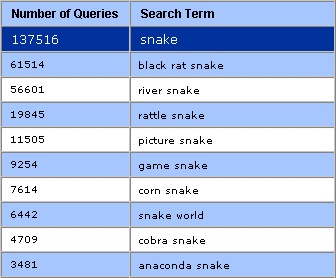Keywords: pick the right ones and you are
well on your way to bringing targeted
qualified visitors to your site. Pick the
wrong words and you've just sabotaged your
entire optimization campaign.
Keyword Selection Is Fundamental
Keyword selection is the first step in
search engine optimization. It's also
where most people go wrong. If you pick a
keyword that is not used by the people
hunting for your product, you won't get
traffic. You must pick popular keywords to
be found.
Get Objective Feedback On Popularity
How do you tell a popular keyword from one
that you "think" might be popular? To get
objective popularity information you need
feedback from the search engines as to how
often your candidate keywords are used as
queries. Using real world data instead of
someone's guess is a vital component of
keyword selection.
There is a fine line between keywords that
are popular and keywords that are too
popular and too general to be useful. For
example, if I enter the keyword, "snake"
into the query box and hit enter, I am told
that snake received 137,516 queries in a
recent month at major search engines. Many times you can
find phrases on that list you may have
completely overlooked in your keyword
brainstorming session that would be perfect
keywords for your site.
How do you determine if something is too
popular or not popular enough? Much of it
depends on the competitive nature of the
keyword and the usefulness of the results.
If someone entered "snake" into a search
engine, they would probably find the
results too general. They would then enter
a new search term that narrowed the scope
of their search.
Statistics show that most searchers end up
using multiple words in their search. So
narrowing the keywords to "snake bite
treatment" or "cobra snake" filters out the
general information about snakes and homes
in on specifically what the searcher is
seeking. Similarly, you should target
candidate phrases so that they reflect the
nature of your site.
Don't Pick Single Word Phrases
If you optimize for a keyword phrase
consisting of 2-3
words, you increase your chances that your
site will be found. Yes, the
keyword popularity will be less than for a
single word, but the phrase will be more
focused and your traffic will be more
relevant.
Here's an example. There was one client who
was convinced he had to have the words
"swimming pool" as his main keywords
because his company installed pools. Now
even though the phrase "swimming pool" is 2
words, it is still too general and someone
using that term in a search engine is going
to get very general non-relevant results -
everything from swimming pool supplies to
hot tub spas.
The searcher hunting for specific
information for swimming pools may
initially search on the general term and
then refine their search when they see the
non-relevant results. The key is: put yourself into the mind
of a customer. People wanting to
install an outdoor swimming pool don't buy
from a company across the country; they buy
from a local pool company.
In this case adding the town name to the
keyword phrase "swimming pool" and
optimizing for the longer keyword phrase
allowed this client to get a top ranking in
that keyword phrase and traffic that
converted into sales. The longer keyword
phrase was less popular than "swimming
pool", but popular enough and more focused
so that it brought qualified motivated
buyers to the site. Everyone was happy:
the client got more relevant traffic for
his business and the customers were better
able to find a local swimming pool maker.
Make It Relevant
Another rule to keep in mind when selecting
keywords is to make sure they are relevant for your
site. Don't just pick something
off the Lycos Top Fifty list to try to
drive traffic to your site. Optimizing for
"Britney Spears" only makes sense if your
site actually is about Britney Spears. The
search engines learned that scam ages ago
and will at best, ignore them, or worst,
penalize you. There's no reason to spam if
you optimize your page correctly.
Divide And Conquer
Don't try to optimize your home page for
every one of your keywords. Focus your pages so 2-3
keywords are relevant per page.
Spread out the related keywords on other
pages in your site. This will create
additional entry pages for visitors to
enter your site on.
Select 10 pages on your site and target 2-3
phrases per page as appropriate. Since
each page is targeted at specific phrases,
they will score higher than a "one size
fits all" solution.
Keywords Placement Counts
Once you identify your keywords, it's time
to put them to work. Search engines read
the HTML code on your Web page and score
the page based on established criteria. If
the search engine finds keywords in
specific locations throughout the document,
it will assume that your page is very
relevant to that keyword. (Read about the steps
involved in page
optimization.
After you strategically place your keywords
on your page, be sure to proof-read your
page - and read it
out loud. Make sure the text on
your page sounds natural, not artificially
stuffed with keywords. Remember, you have
to please human visitors to your site as
well as search engines.
